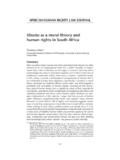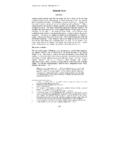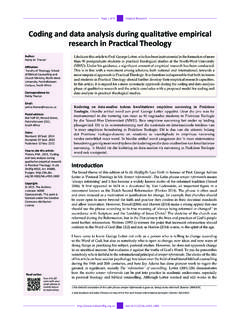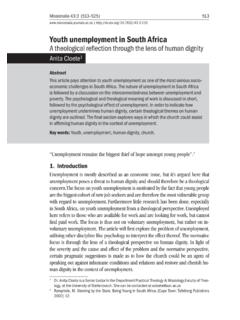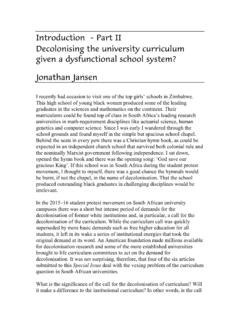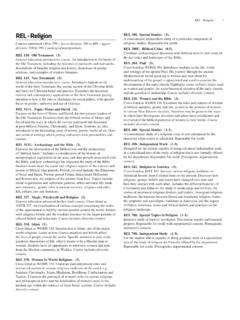Transcription of Narrative-critical approach as hermeneutical framework …
1 Narrative-critical approach as hermeneutical framework for a creative dialogue between biblical sources and secular extra-biblical sources: The Lord of the Rings as an entry into the Book of Revelation R Meylahn1(University of Pretoria) ABSTRACT Narrative-critical approach as hermeneutical framework for a creative dialogue between biblical sources and secular extra-biblical sources: The Lord of the Rings as an entry into the Book of Revelation This essay is motivated by the challenge that biblical texts have very often lost their affective power to address and transform the lives of readers today, because they are either not read at all or they are not fully understood as the world of the text is too far removed from the world of the reader.
2 There are however wonderful contemporary texts that do affect readers lives and the question arose if the contemporary texts cannot be read together with the biblical texts, to bring them to life again? A hermeneutical approach needed to be found that could create the necessary space for non-biblical literary texts to be used to interpret and elucidate biblical texts. The narrative approach provides this space for the two texts to enter into creative dialogue, given that the two texts coincide sufficiently in the significance for the two implied authors, the reference of the texts and in the situation of the implied readers. 1 INTRODUCTION It is not uncommon these days to be shown a movie clip or to be reminded of a best-selling novel in a sermon as the preacher uses these to elucidate a biblical text.
3 The reason for this increased use of multi-media is not just to enhance the act of worship or to bring it in line with the digital world of our life-experiences, but is rather a response to numerous challenges that we as a church face regarding the Bible. I believe that these challenges are hermeneutical 1 Dr R Meylahn is a Research Associate of the Department of New Testament Studies at the University of Pretoria. 174 Narrative-critical approach challenges, as we struggle to interpret and understand the Bible and ourselves in relation to the Bible. I would like to highlight just three of these challenges. The first challenge is described by James Smart as the strange silence of the Bible in the church (Smart 1970) and refers to biblical illiteracy.
4 This was also Ebeling s concern, that for the modern person discussions and reflections about God are nothing more than a tradition, a mere form of speech, a dead relic of the language of the past (Ebeling 1967:3). The current situation in the Western world is that the world is emerging from the secularised modern proclamation that God is dead, into a postmodern era where there is a new found interest in religion and with this interest a rise in religious fundamentalism and thus the markets are flooded with biblical and devotional literature. If there is such a surplus of biblical literature available, is it plausible to describe this phenomenon as biblical illiteracy?
5 James Smart argues that in a century during which biblical scholarship has made tremendous advances in America, with literature on the Bible expanding enormously and a number of new highly readable translations become best sellers, there has been an increasing frustration of preachers with Scriptures as a basis for sermons, a steady decline in the educational use of the Bible in the church, and a mounting ignorance of the contents of the Bible among members of the church (Smart 1970:9-10). His concern is not that the Bible is not used, but how the Bible is used. The Bible is used mainly for personal devotions which would explain the explosion of devotional literature, but he argues that this Bible use seems to be totally devoid of any biblical insight on questions such as race, nation, wealth, war, ecumenical relations between Christian churches, and the total responsibility of the church for the world beyond itself (Smart 1970:17).
6 If this reality of the Bible is lost and the reading of the Bible is reduced to personal devotions and individual spiritual growth then Smart argues that the church and the world no longer hear the essential message of the Scriptures and soon cease to understand what the Bible is for and are thus open to be captured by the dominant religious philosophy of the moment, which is usually some blend of cultural nationalism with Christianity (Smart 1970:10). This is what is happens for example when the political right and Christian fundamentalists become very compatible bedfellows. They agree on the personal issues of values and morality and support each other on public and foreign issues.
7 ISSN 1609-9982 = VERBUM ET ECCLESIA JRG 30(1)2009 175 The second challenge is the role of the Bible within postmodernity. The fundamentalists understand the Bible as the book of literal truths, while in a postmodern context fundamental truths, absolutes and authority are questioned and deconstructed. Should the Bible and Christianity be abdicated to the fundamentalists or is there another response to postmodernity where the Bible can still play an important authoritative role in the construction of Christian identity and ethics? I believe that, as protestant Christians, we cannot give up one of our founding pillars (sola Scriptura) and need to struggle with this idea of founding authoritative narratives that play a primary role in the construction of Christian identity, which then inevitably determines our ethics in the world.
8 Authority, understood as Sch tz (Sch tz 1975) understands authority, is that which exerts affective power. Authoritative power is the power to bring about something or to affect something in the world. I believe this is the role of Scripture within the world and especially amongst believers to affect faith, identity, and thus influence ethics in the world, through the power of the Holy Spirit. This leads this article into the third challenge, namely, if the texts are to play such an important founding/authoritative role in the construction of identity which impacts our ethics, these texts need to be understood and read correctly . I am fully aware that there cannot be one correct reading of a text, but I do believe that one should seek to remain true to the intention of the text.
9 This leads us back to Smart s problem that the Bible is not read correctly within the church. According to him the reason for this is a biblical illiteracy caused by a hermeneutical blindness. Many preachers are trained for years to do proper exegesis and text interpretation, but these skills are not transferred to the lay member and thus a tremendous gap is created between a scholarly interpretation of texts and the interpretation of the lay member. The hermeneutical task has been left to the academic professionals (Wink 1973:8-11), whilst it should be brought into the midst of the congregational life if Scripture is to play its role as founding narrative (sola Scriptura).
10 The fact that the Bible is embedded in a language and a language world that is far removed from our own particular language worlds aggravates these challenges. Given that the various books that together make up our New Testament took shape in the context of the struggles of God s people with their identity and their purpose 176 Narrative-critical approach before God and in ever-expanding contexts, does it not follow that these texts might also shape our similar struggles? (Green 1995b:413). What does this mean today for readers of these texts? These books were written in a language that was embedded in the cultural world of the believers. The authors used symbols and metaphors that today do not make any sense.
